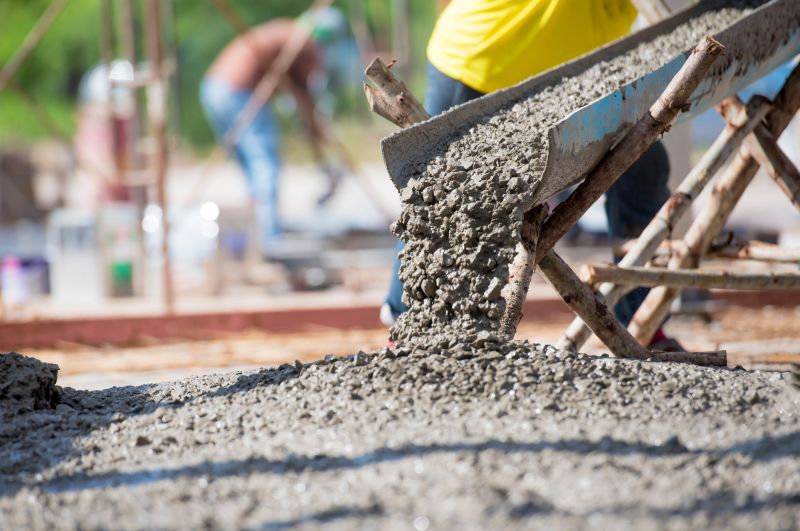Leading Products For Concretes That Ensure Durability and Strength
Explore top-rated concrete products designed to enhance strength, durability, and performance for various construction needs.
 Products for concretes encompass a wide range of tools, supplies, and materials designed to facilitate the mixing, pouring, finishing, and curing of concrete. These products are essential for both professional contractors and DIY enthusiasts aiming to achieve durable and high-quality concrete structures. From basic mixing tools to advanced finishing equipment, the variety ensures that users can find solutions tailored to different project sizes and complexity levels.
Products for concretes encompass a wide range of tools, supplies, and materials designed to facilitate the mixing, pouring, finishing, and curing of concrete. These products are essential for both professional contractors and DIY enthusiasts aiming to achieve durable and high-quality concrete structures. From basic mixing tools to advanced finishing equipment, the variety ensures that users can find solutions tailored to different project sizes and complexity levels.
Top Overall Option
Concrete Mixing and Finishing Kit
A comprehensive concrete mixing and finishing kit provides a versatile set of tools suitable for various projects. It typically includes a durable mixer, trowels, floats, and finishing tools designed to handle different stages of concrete work. This all-in-one solution can help streamline the process from mixing to finishing, making it a practical choice for many users.
Types of Products For Concretes
Portable Concrete Mixers
Designed for small to medium projects, portable mixers help mix concrete on-site with ease and efficiency.
Electric Concrete Vibrators
Vibrators assist in removing air bubbles and ensuring proper compaction of poured concrete.
Concrete Trowels
Used for smoothing and finishing concrete surfaces, available in hand-held and power varieties.
Concrete Floats
Float tools help achieve a flat, smooth surface during the finishing process.
Curing Compounds
Applied to concrete to retain moisture and promote proper curing.
Concrete Sealers
Sealants protect concrete surfaces from water, stains, and wear.
Concrete Edgers and Groovers
Tools used to create decorative edges and control joints in concrete slabs.
Crack Repair Products
Patching compounds and fillers designed to repair cracks and prevent further damage.
Colorants and Stamps
Products that add decorative color or patterns to concrete surfaces.
Concrete Buckets and Wheelbarrows
Essential for transporting and pouring mixed concrete efficiently.
Form Release Agents
Used to prevent concrete from sticking to forms during pouring.
Concrete Cutting and Drilling Tools
Equipment for making precise cuts and holes in hardened concrete.
Surface Prep Equipment
Tools for preparing existing concrete surfaces for repairs or overlays.
Concrete Additives
Chemical admixtures that modify properties like setting time and workability.
Rebar and Reinforcement Mesh
Materials used to reinforce concrete structures for added strength.
Popular Choices
Widely used for small to medium projects, these mixers facilitate on-site concrete preparation.
Power trowels help achieve smooth, flat surfaces efficiently on larger slabs.
Vibrating screeds assist in leveling and consolidating concrete quickly.
Essential for detailed finishing and edge work on concrete surfaces.
Popular for protecting and sealing finished concrete surfaces against stains and wear.
Trending for decorative projects, these products add visual interest to concrete surfaces.
Commonly used for maintenance, these kits help address cracks early.
Popular for creating clean, defined edges and preventing form sticking.
Used frequently for precise cuts in hardened concrete for expansion joints or modifications.
In demand for preparing existing surfaces for overlays or repairs.
Commonly used reinforcement material to improve concrete durability and strength.
Popular for decorative finishes, adding color to enhance aesthetic appeal.
Frequently used for repairs and surface restoration of concrete structures.
Concrete mixing involves the use of various types of mixers, which can range from portable handheld units to large, industrial-grade machines. Proper mixing ensures a consistent and workable concrete mixture, which is crucial for the strength and longevity of the finished product. Once mixed, concrete must be poured and spread evenly, often requiring specialized tools such as shovels, wheelbarrows, and vibrators to remove air pockets and ensure proper compaction.
Finishing products are vital in achieving a smooth, level surface. Trowels, floats, and edgers help shape and refine the surface, while curing compounds and sealers protect the concrete during the initial setting phase. For decorative finishes, there are stamping mats, colorants, and textured overlays that add aesthetic appeal. Maintenance and repair products like patching compounds and crack fillers are also important for long-term durability.
Selecting the right products depends on several factors including the scope of the project, the type of concrete work, and environmental conditions. Proper tools and materials can improve efficiency, safety, and the overall quality of the finished concrete. Whether working on a small driveway or a large commercial slab, understanding the options available can help ensure successful outcomes and long-lasting results.
Key Buying Considerations
- Project size and scope to determine the necessary capacity and quantity of materials.
- Type of concrete work, such as pouring, finishing, or repairing, to select appropriate tools.
- Compatibility of products with existing equipment and surfaces.
- Durability and quality of materials to ensure long-term performance.
- Ease of use and ergonomic design for safety and efficiency.
- Power source preferences, such as manual, electric, or gas-powered tools.
- Specific features like adjustable settings or attachments for versatility.
- Brand reputation and customer reviews for reliability and support.
- Budget constraints balanced with quality and functionality.
- Environmental conditions, including temperature and humidity, that may affect curing or application.
- Availability of replacement parts and accessories for ongoing maintenance.
- Storage and transportation considerations for larger equipment.
- Compliance with safety standards and certifications.
- Compatibility with other products or systems used in the project.
- Warranty and customer support services offered by manufacturers.
This page contains affiliate links. We may earn a commission from qualifying purchases at no additional cost to you.
